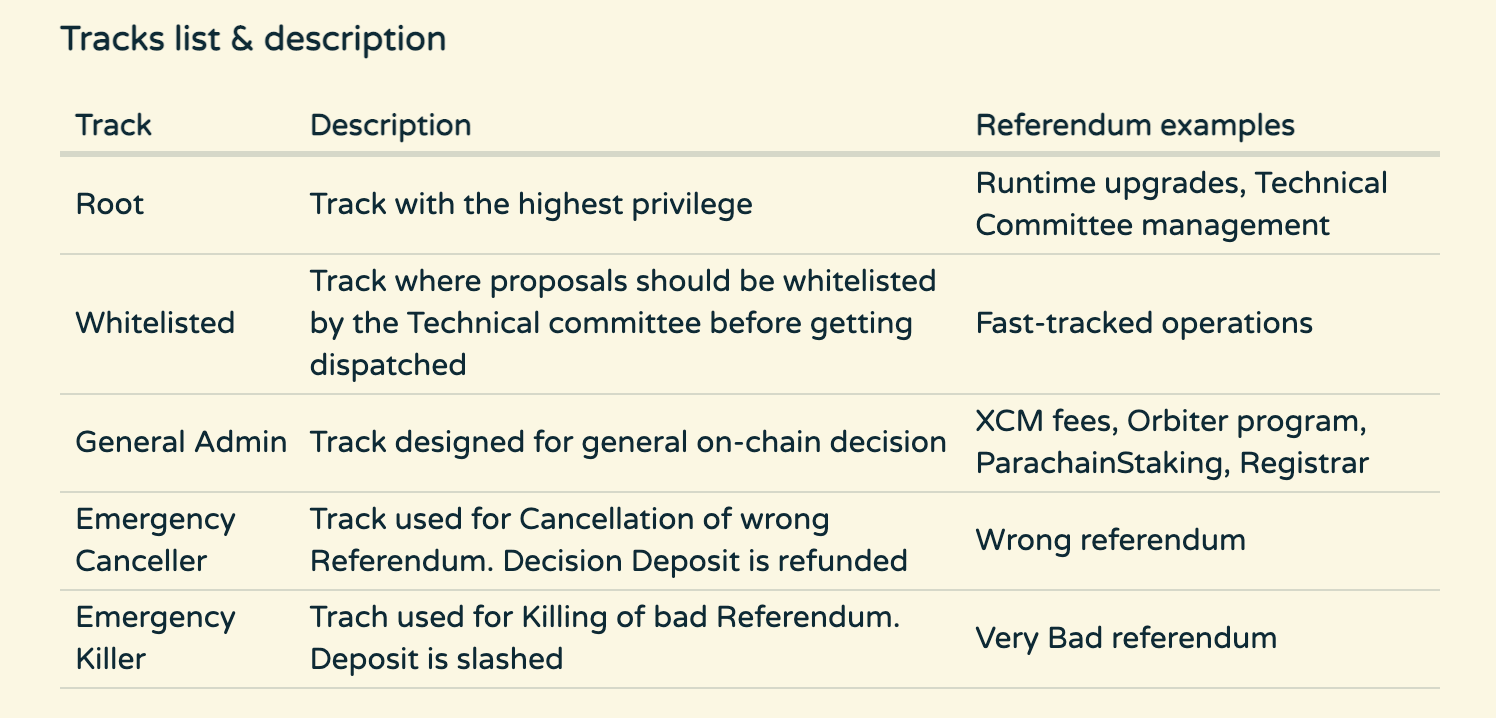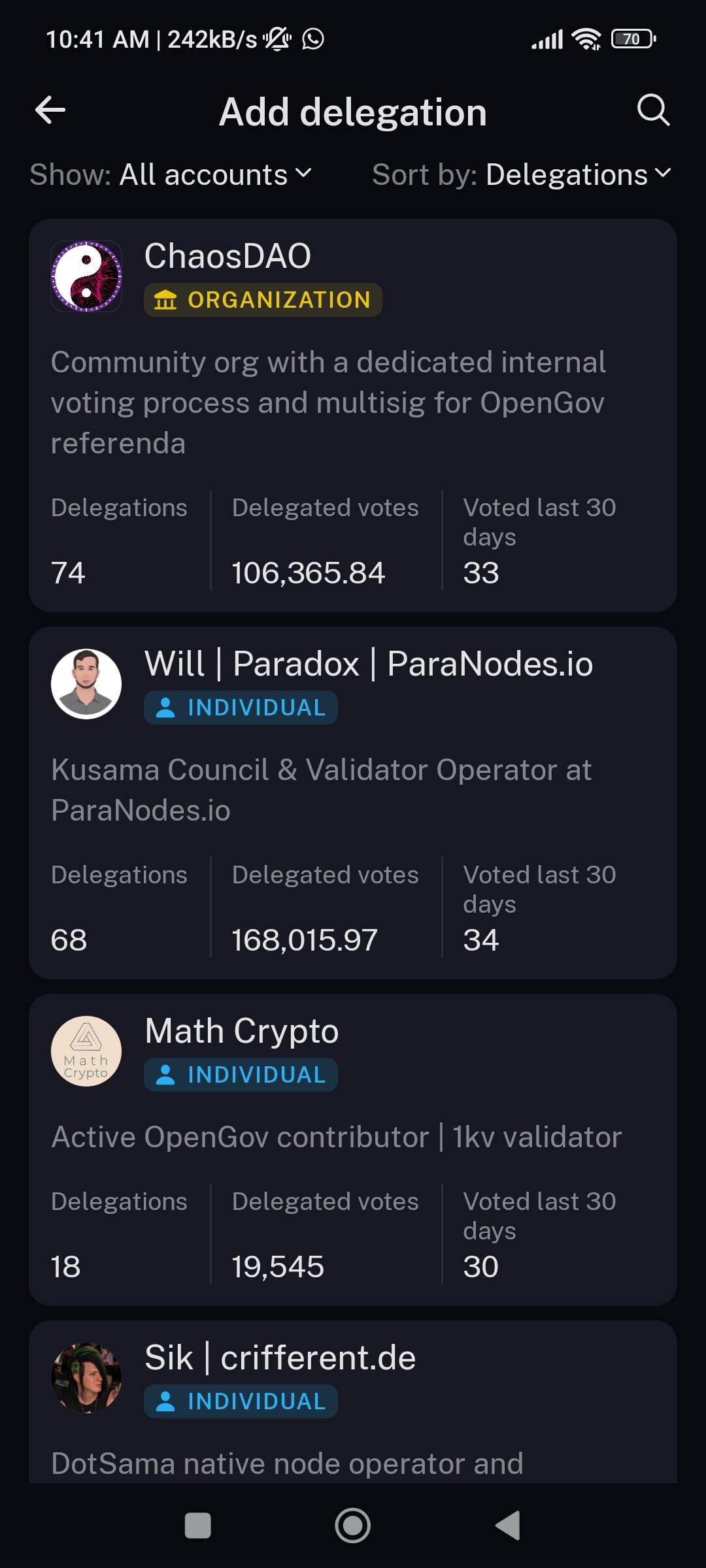Introducing Delegated Voting: Enhancing Governance on Moonriver and Moonbeam
TLDR: delegated voting will soon be introduced to Moonriver and Moonbeam. This post aims to present the primary benefits and potential drawbacks of implementing this governance mechanism. Furthermore, it seeks the community’s input regarding a Community Delegate Code of Conduct.
OpenGov brought a multi-role delegation feature to Moonriver, enabling token holders to delegate their tokens for voting purposes based on tracks. Previously, delegated voting existed, but a complicated user interface (UI) deterred many users from utilizing it. However, with the new delegation feature that will soon be integrated into the [Moonbeam DApp], this hurdle is eliminated, making vote delegation easier than ever.
Overview
Delegated voting is a mechanism that can empower token holders to delegate their voting power to a trusted individual or group, enabling them to vote on their behalf. This system is implemented with the objective of enhancing decision-making efficiency and ensuring that governance matters are handled by individuals possessing the necessary expertise and knowledge. It’s important to note that even when tokens are delegated, they remain securely stored in the original wallet. Additionally, voters utilizing delegation retain the flexibility to modify their chosen delegates or reclaim their voting power whenever they deem necessary.
Pros and Cons
Delegated voting, as a governance mechanism, presents both advantages and disadvantages worth exploring. Understanding these pros and cons is crucial for assessing the potential impact of delegated voting on the overall effectiveness and inclusivity of decision-making processes within a community.
One of the primary advantages of delegated voting is its ability to promote efficient community based decision-making. By allowing token holders to delegate their voting power to trusted individuals, delegated voting ensures that decisions are made by individuals with expertise in relevant domains. Delegated voting also empowers token holders who may lack the time or expertise to actively participate in governance, providing them with the opportunity to contribute to decision-making indirectly.
Furthermore, delegated voting has the potential to solve the issue of low voter turnout or ‘voter apathy’ that is frequently observed in decentralized communities. This issue is critical because it can cause significant delays in critical updates, such as runtime upgrades. Conversely, low turnout can lead to malicious actors harming the network with lower stakes, which can be detrimental to the entire ecosystem. By delegating their voting power to delegates who share their values and interests, token holders can remain involved in governance processes without needing to participate directly on every issue. This characteristic promotes wider participation and ensures that decisions are not solely based on a small group of highly active token holders.
However, there are certain drawbacks to consider when implementing delegated voting. One concern is the potential for centralization of power. If a small number of influential delegates accumulate a significant amount of voting power through delegation, they may exert undue influence over governance decisions. This concentration of power could undermine the principles of decentralization and lead to decisions that may not truly reflect the collective interests of the token holders.
Another challenge associated with delegated voting is the risk of delegate misconduct or negligence. While delegates are entrusted with voting power on behalf of token holders, there is a possibility that they may act in their own self-interest or fail to fulfill their responsibilities diligently. To address this issue, establishing a clear code of conduct for delegates and implementing mechanisms for transparency and accountability become crucial in order to safeguard the interests of token holders. Therefore, one of the objectives of this post is to gather input from the community regarding what should be included in the delegate code of conduct. As for the enhancement of transparency, the initial step will involve creating a dedicated space for delegates in a community Forum where they are required to update their delegators about decisions they make and explain rationale behind each vote.
It should be noted that delegation is a permissionless process, and token holders are not obligated to adhere to the code of conduct. However, if a potential delegate wishes to utilize community resources and openly present themselves as a delegate to other community members, such as through the Community Forum or the Moonbeam Dapp, it is reasonable for the community to request the observance of the Community Delegate Code of Conduct.
In conclusion, delegated voting offers advantages such as efficient community decision-making and increased participation. However, it also presents concerns regarding the potential centralization of power and the need for robust checks and balances to ensure delegate accountability. Careful consideration and thoughtful design of the delegated voting system, including mechanisms for delegate selection and accountability, are necessary to maximize the benefits and mitigate the drawbacks of this governance mechanism.
Delegated voting on Moonriver & Moonbeam
Delegated voting has been a feature of Polkadot’s governance for some time, but its potential has not been fully realized due to the complicated UI. However, this is about to change with the upcoming Moonbeam Dapp update which will enable token holders to delegate their votes more easily. Through this new functionality, token holders can delegate their voting power based on five different tracks. These tracks correspond to the different processes that proposals undergo during a referendum, depending on their level of emergency and importance.
(to read more about different tracks see here)
For example, Root track is designated for highly critical updates such as runtime upgrades, and token holders can choose to delegate their voting power to a delegate who has the necessary expertise and knowledge about the networks and their ecosystems. This will ensure that critical decisions are made by individuals who are well-informed and have the necessary experience to make strategic choices. The General Admin track, on the other hand, is open for general on-chain decisions, and token holders can delegate their voting power to any delegate or even choose to vote themselves. It is important to note that token holders can change their delegate or take back their voting power at any time. This flexibility provides token holders with the opportunity to remain engaged in governance processes without requiring direct involvement.
Overall, the implementation of delegated voting on Moonriver/Moonbeam is poised to promote efficient decision-making and encourage broader participation in governance processes. Token holders have the opportunity to delegate their voting power to delegates with the necessary expertise while retaining the flexibility to change their delegate or vote themselves.
Points for discussion
In order to ensure the integrity and effectiveness of delegated voting on Moonriver/Moonbeam, it is important to establish a clear Community Delegate Code of Conduct. Here are the initial guidelines based on the research on the topic:
-
Act in the best interest of the network: Community Delegates should prioritize the long-term success and development of Moonriver/Moonbeam and make decisions that benefit the networks and broader community.
-
Vote on the vast majority of proposals: Community Delegates are expected to actively participate in the governance process by casting votes on the majority of proposals. This ensures that token holders’ voting power is utilized effectively.
-
Be knowledgeable about developments in the network: Community Delegates should stay informed about the latest updates, advancements, and challenges within the Moonriver/Moonbeam ecosystem to make well-informed decisions.
-
Review each proposal thoroughly before casting a vote: Community Delegates must carefully examine and analyze each proposal before voting. This ensures that decisions are based on a comprehensive understanding of the proposal’s potential impact.
-
Notify delegators about the rationale behind each vote: Community Delegates should communicate the reasoning behind their voting decisions to the token holders who have delegated their voting power. This fosters transparency and helps delegators understand the delegate’s approach.
-
Adhere to transparency and disclose any conflict of interest: Community Delegates should be transparent about any conflicts of interest that may arise and disclose them to the community. This fosters trust and ensures that decisions are made without bias.
-
Communicate intention to stop being a delegate at least 1 month prior to termination: Community Delegates should provide adequate notice to their delegators if they plan to stop serving as a delegate. This allows delegators sufficient time to transfer their tokens to another delegate.
-
Delegates should engage in the debate process, take a position on governance proposals, and abstain in rare circumstances: Community Delegates are encouraged to take a clear position on governance proposals, expressing their support or opposition. However, in exceptional cases where there is a conflict of interest or lack of information, delegates may choose to abstain from voting.
We value your input and perspectives. Therefore, we invite you to share your thoughts on the proposed Community Delegate Code of Conduct and the implementation of delegation. Are there any additional guidelines you believe should be included? What measures do you think should be implemented to ensure delegate accountability and transparency? Feel free to comment below as your feedback will contribute to shaping a robust and fair governance system for Moonriver/Moonbeam.
In addition, there is an ongoing survey on vote delegation where you can get a chance to be one of 20 winners to receive $100 USDC by filling it out by May 31, 2023.

